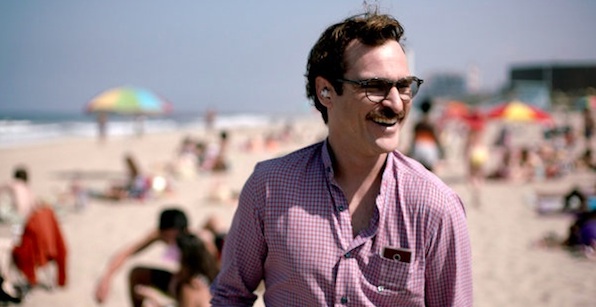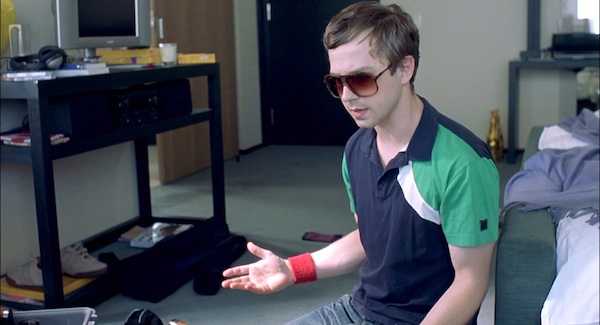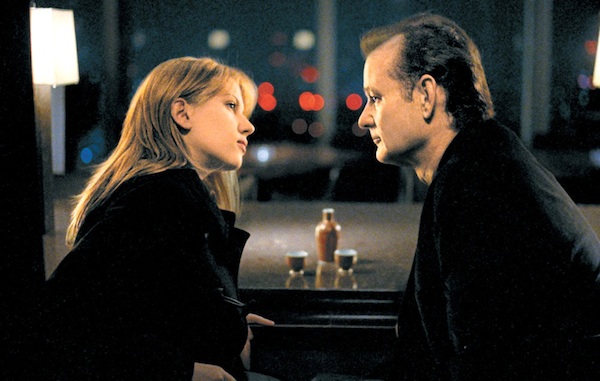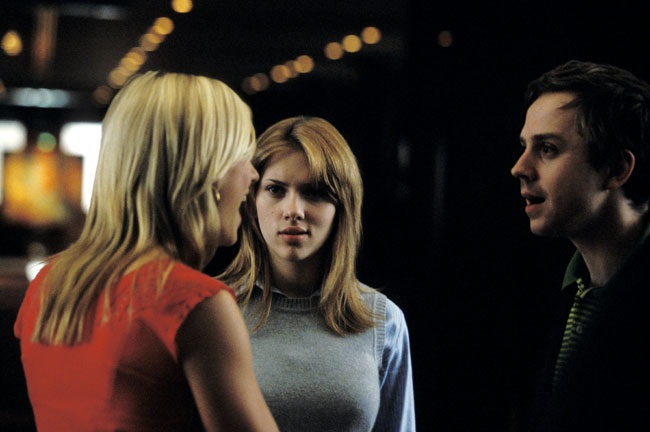At the top of a press conference for the San Francisco Film Society, Spike Jonze explained the plot of his newest film, Her. “The movie is a love story—nee a relationship story—between a man and an artificially intelligent operating system.” You might have expected someone in the crowd to laugh because the premise is a comedy, or because the director’s voice is uniquely nervous-sounding, but whatever the reason, he really wanted to interrogate the giggles. “Why’s it funny?” The moderator intervened and Jonze piped up, “I really want to know.”
In 2003, Jonze and Sofia Coppola ended their four-year marriage. Amidst the dismissal of many rumors the couple was separating, Jonze reportedly missed the premiere of Coppola’s Oscar winning Lost in Translation. (This doesn’t mean he didn’t see it.) If you thought they were together his absence looks cruel; if you knew they were splitting his absence looks more like a survival tactic.
At the time, E! Online called Coppola and Jonze the “first couple of indie film.” Reviews couldn’t resist seeing their marital strife telegraphed through their films: Scarlett Johansson’s worried newlywed looked like the Coppola’s proxy; one review remarked on the brand of “schlubbiness” that made Giovanni Ribisi’s neglectful workaholic husband comparable to “the director’s own.” In the context of a film that hangs its sense of unmoored sadness on lonely marriages, these comparisons can’t help feeling pointed.
Yet both Lost in Translation and Her are “personal films” by storytellers idiosyncratic enough to qualify as “auteurs.” They filter their motives onto the screen: that’s what “personal film” means, and viewers are meant to regard that with some reverence—even if it’s also a trait the film’s marketing exploits.
Other cinematic contaminations of real life may appear crueler than this one. When Elizabeth Taylor, then newly wed to Eddie Fischer, fell for her Cleopatra costar, the ancient story of royal adultery they starred in became a surrogate for their romance—what America didn’t read in scandal rags we could glean from watching the movie. At least with Jonze and Coppola, we’re kind enough to let the film’s makers be their own mouthpieces. It’s hardly like Liz, Dick or Eddie wrote a word of Cleopatra, but viewers can’t help opportunistically seeing a resemblance, fair or not, in most cases.
Jonze’s protagonist/proxy is Theodore Twombly (Joaquin Phoenix). The gangly-named writer makes a living ghostwriting personal correspondence for a company called “BeautifulHandwrittenLetters.com.” Like Jonze, it’s Theodore’s job to conjure feelings out of the imaginary worlds of others—and his world is full of strangers. The evening commute is a rash of bodies talking into earpieces. Walkers on the smoggy strips between public transport lines resemble planets with their own solar systems (voicemail, ichat, photographs, celebrity gossip, notices from the LA Times; their own scrapbooks of past emails). Samantha (Scarlett Johansson) can scale these down for you and just give you the action items upfront. She’s the romantically inclined OS with AI (as mentioned by Jonze above) and she, pleasantly, has your answers. Facing thousands of emails Theodore saved from his last job, Samantha can instantly read them and determine “I only see eighty seven worth keeping.” Forget the judgment on Theodore’s sparkling email wit: what you just heard is that even in the catalogues of our human interactions, there is a right answer.
Tokyo’s neon skyline surrounds Charlotte (Johansson) and Bob (Murray) at their glassy hotel bar. Instead of transforming into a welcomed part of the solar system, the two are afloat in the dark and trapped in a booze-scented fishbowl. They offer each other the recognition we relegate to hotel “neighbors,” people simultaneously foreign and familiar—we can be especially intimate with them because our vulnerability lacks consequences. We worry the two can destroy their already fraught marriages with an affair (both imply they fear divorce), but the weightiest element of an otherwise floating film is the realization their desperation for a connection can’t climax with sex. They’ve had sex; what they haven’t had is a human connection.
Despite holding the final divorce papers Twombly refuses to sign because he’s “waiting not to care anymore.” This sounds like a misrepresentation: somehow “not caring” feels like part of why he’s divorcing. When he explains the situation to his AI-GF, he says his ex came from a family of writers who “had to get things right” while Theodore’s family (also presumably writers) “just tried things.” When he meets his ex (Rooney Mara) for lunch, she looks very put together—and appalled her newly minted ex-husband is dating A.I. Who couldn’t think that says something? Something about the cowardice of the human participant, his failure as an adult, the effort he grossly evades by dating a consciousness that exists to serve him, a consciousness that can’t get a cold or have a reason to say “not now.” He’s a warm and tender lover to Samantha, but the fantasy of Theodore Twombly has the potential to offend every woman with a body…which is all of them.
The stakes of Lost in Translation are amplified, or at least thrown into relief, by the characters’ emotional detachment. Naturally sex is a curiosity and a threat—not precisely a real thing to them—but it’s the viewers, not the characters who envision a resolution in bed. It’s as if making that one experience real could jostle into order the other stuff they can’t seem to believe in anymore. The film accomplishes a great many things but this is its most analyzed mystery, and unlike other talking points (Rosebud, he’s a ghost, it was always America you damned, dirty ape) it provides no reveal; instead it deepens our grasp of the character’s potential to feel/heal and ours by proxy. Yet the emotional detachment, like their hotel visits, is temporary. Sure Bob looks like he gets caught in his ennui with some frequency, but also says things to suggest it’s not a permanent state. Theodore, however, has just found a way to avoid his romantic retardation forever—his detachment is hardly temporary.
Sex is somewhat hypothetical in Her and comically the film’s none too sad about that. Even before Theodore buys his AI-GF, he regularly checks out the women offering themselves up for quick, anonymous phone sex (glad we never meet the weirdo he snags there). Person to person interaction is similarly ugly; a desperate blind date reveals a mess of social ineptness that makes the proposition of romance with a human downright dangerous. Women—other humans, really—are broadly concepts to Theodore, which makes Samantha seem logical, ideal, made to order. Theodore “left his wife alone in the relationship” and identifies with Samantha’s burgeoning sense of self. “Are these feelings real?” is a statement worthy of A.I., yet applies to them both. Samantha doesn’t seem able or programmed to hurt anyone. Her feelings exist for her to know Theodore better; her lack of a physical body doesn’t much differentiate her from others who also exist as concepts. Samantha can absorb information and evolve at a rate faster than her mate, dwarfing him despite the fact he could as easily dismiss her. In ways, she’s like a sexy mother-bot. The only personal question the introductory interface asked him was about his mom….
Anna Faris has a brief part in Lost in Translation as the starlet in Ribisi’s photo shoot. She’s vivacious, vapid and a threat to Charlotte’s marriage by sheer proximity. Yet the real threat to Charlotte’s marriage isn’t a party girl. What she’s doing befriending Bob may be more hazardous, so why is it more forgivable?
As with love, divorce represents a great mystery: How do you kill the strongest human emotion? How could two people who knew each other intimately feel like strangers? Lost in Translation reads like an internalization of these fears—before they manifest in reality. Her is a fantasy about what moving on might look like if our futurescape included A.I. fixers to rebound with—it wrestles too directly with romantic suffering to feel anything has been internalized. It’s too plainly cathartic. Which is why it seems like a bloodstained apology to an ex wife who dealt with this ten years ago, and now it’s his turn.
In flashback, Mara and Phoenix don traffic cones and butt orange heads. It recalls a Christmas card in which Jonze and Coppola wore dog and cat masks. Foggy and faux-vintage, it felt like a memory in process. It also looked like a shared vision, its affection was convincing.
At a certain point connections start seeming arbitrary: why, for example, was Jonze regular director of photography Lance Acord, conspicuously absent from Her? Does it have anything to do with the fact he did cinematography for Lost in Translation? But why should we turn a human mystery into something with an answer?
Shot between smoggy Los Angeles and smokey Shanghai Her recreates a sense of familiar foreignness—a coziness we might share with a place or a time we may not see again. The feeling is diffuse and contradictory, but we’re used to that by now.









